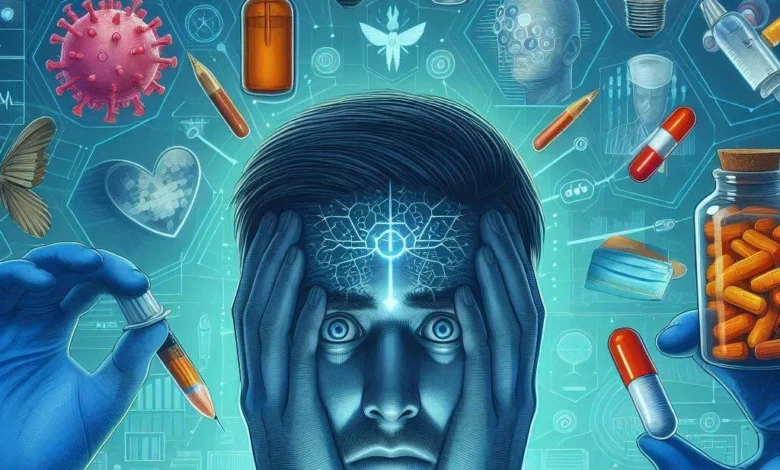10 Innovative Therapeutic Approaches for Anxiety and Depression to Watch in 2024

1. Virtual Reality Therapy
Virtual reality (VR) therapy is gaining traction as a promising treatment modality for anxiety and depression. By immersing individuals in virtual environments, therapists can create tailored scenarios to help patients confront their fears and negative thought patterns in a controlled setting. Studies have shown that VR therapy can reduce symptoms of anxiety and depression by providing a safe space for exposure therapy and cognitive-behavioral interventions.
2. Ketamine Infusion Therapy
Ketamine infusion therapy has emerged as a rapid-acting treatment for severe depression and treatment-resistant anxiety disorders. By targeting the brain’s glutamate system, ketamine can produce rapid antidepressant effects, offering relief to individuals who have not responded to traditional medications. This innovative approach is administered in a clinical setting under close supervision and has shown promising results in improving mood and reducing suicidal ideation.
3. Biofeedback and Neurofeedback
Biofeedback and neurofeedback techniques harness the power of real-time data to help individuals regulate their physiological responses and train their brains to function more efficiently. By providing visual or auditory feedback on biological signals such as heart rate variability or brainwave activity, these approaches empower individuals to learn self-regulation skills and reduce symptoms of anxiety and depression. Biofeedback and neurofeedback have been shown to improve emotional regulation, attention, and overall well-being.
4. Medicinal Cannabis
Medicinal cannabis, particularly compounds like cannabidiol (CBD) and tetrahydrocannabinol (THC), is being explored for its potential therapeutic benefits in managing anxiety and depression. These compounds interact with the endocannabinoid system in the body, which plays a role in regulating mood, stress response, and emotional processing. Preliminary research suggests that medicinal cannabis may have anxiolytic and antidepressant properties, although more studies are needed to fully understand its efficacy and safety profile.
5. Transcranial Magnetic Stimulation (TMS)
Transcranial magnetic stimulation (TMS) is a non-invasive brain stimulation technique that uses magnetic fields to modulate neuronal activity in specific regions of the brain. TMS has been approved by regulatory agencies for the treatment of depression and is also being investigated for its potential in managing anxiety disorders. This cutting-edge approach offers a targeted alternative to traditional pharmacological interventions and has shown promise in improving mood and cognitive functioning in patients.
6. Mindfulness-Based Interventions
Mindfulness-based interventions, such as mindfulness-based stress reduction (MBSR) and mindfulness-based cognitive therapy (MBCT), are evidence-based approaches that emphasize present-moment awareness and acceptance of thoughts and emotions. These interventions have been shown to reduce symptoms of anxiety and depression by cultivating mindfulness skills and promoting emotional resilience. By incorporating practices like meditation, yoga, and body scan exercises, individuals can develop a greater sense of self-awareness and coping strategies.
7. Art Therapy
Art therapy is a creative and expressive approach that uses visual arts, music, and other artistic modalities to facilitate self-exploration and emotional healing. By engaging in the creative process, individuals can externalize their internal struggles and gain insights into their thoughts and feelings. Art therapy offers a non-verbal means of communication and can be particularly beneficial for individuals who have difficulty expressing themselves verbally. Through the use of various art materials and techniques, individuals can tap into their inner resources and enhance their emotional well-being.
8. Table: Comparison of Innovative Therapeutic Approaches
| Therapeutic Approach | Targeted Conditions | Key Benefits |
|---|---|---|
| Virtual Reality Therapy | Anxiety, Depression | Exposure therapy, Cognitive-behavioral tools |
| Ketamine Infusion Therapy | Severe Depression | Rapid antidepressant effects, Treatment-resistant |
| Biofeedback and Neurofeedback | Emotional Regulation | Real-time data for self-regulation, Improved mood |
| Medicinal Cannabis | Anxiety, Depression | Anxiolytic, Antidepressant properties |
| Transcranial Magnetic Stimulation | Depression, Anxiety | Non-invasive brain stimulation, Improved mood |
| Mindfulness-Based Interventions | Stress, Depression | Mindfulness skills development, Emotional resilience |
| Art Therapy | Emotional Healing | Creative expression, Non-verbal communication |
9. Frequently Asked Questions (FAQ)
Q: Are these innovative therapeutic approaches suitable for everyone with anxiety and depression?
A: The effectiveness of these approaches may vary from individual to individual, and it’s important to consult with mental health professionals to determine the most appropriate treatment plan for your specific needs.
Q: Are these approaches covered by insurance?
A: Coverage for these innovative therapies may vary depending on your insurance provider and policy. It’s recommended to check with your insurance company to understand your coverage options.
Q: Can these approaches be used in combination with traditional treatments?
A: In many cases, these innovative approaches can complement traditional treatments such as medication and therapy. It’s essential to work with your healthcare provider to develop a comprehensive treatment plan.
10. Key Takeaways
In conclusion, the field of mental health care is evolving rapidly, with innovative therapeutic approaches offering new possibilities for individuals struggling with anxiety and depression. From virtual reality therapy to mindfulness-based interventions, these cutting-edge methods hold promise for improving mood, reducing symptoms, and enhancing overall well-being. By staying informed about the latest advancements in mental health treatment, individuals can access a diverse range of options to support their healing journey. Embracing innovation and seeking personalized, evidence-based care are key steps towards better mental health outcomes in 2024 and beyond.



